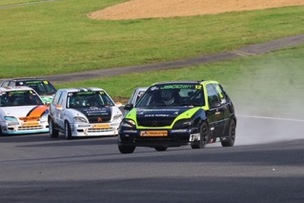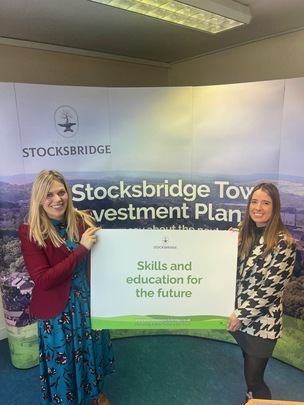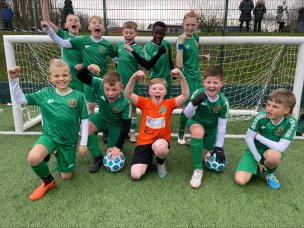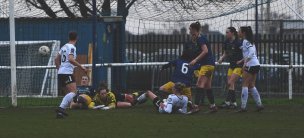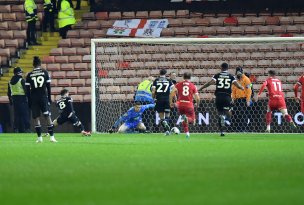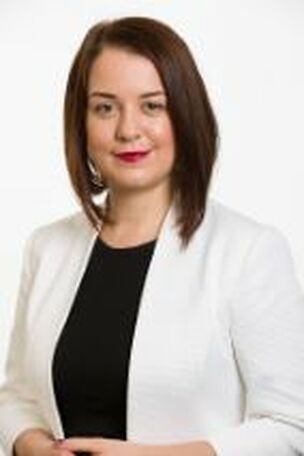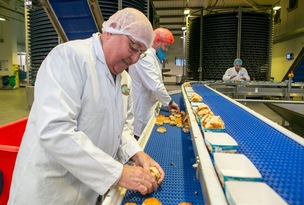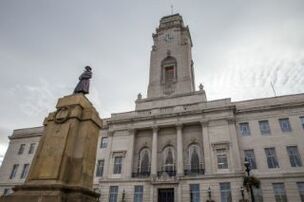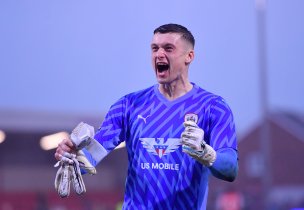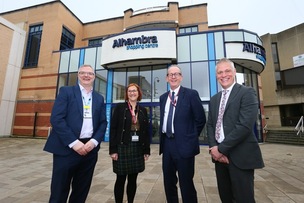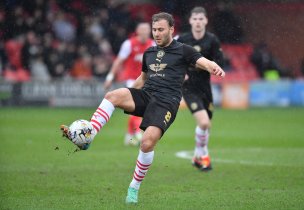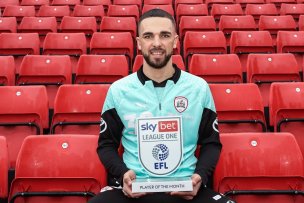Bobby Moore, Geoff Hurst, George Best, Denis Law, Bobby Charlton, Franz Beckenbauer. Pat Howard went head to head with some real footballing greats during a career which took him from Barnsley to the USA. But there’s one opponent who climbs above even that top-quality list in the eyes of the former centre-half.
“When people ask me the best player I played against, I’m proud to be able to say Pele,” the Oakwell youth product who played 200 times for the Reds told the Chronicle.
Not bad for a lad from Dodworth!
The big moment came during an end-of-season tour with Newcastle United in 1972, when the Magpies took on Pele’s Brazilian club Santos in Hong Kong.
“They beat us 4-2 and the great man scored a hat-trick. No professional player likes losing, even in a friendly, but what a privilege to be on the same pitch as a player like him.”
Howard had left Barnsley for St James’ Park in a £23,000 deal in September 1971, following in the footsteps of his old Oakwell team-mate Stewart Barrowclough (transferred in August 1970) and making his debut in a 2-0 home top-flight win over Wolves in front of 29,347.
That contrasted with a 5,751 crowd for his last Barnsley game, a 2-1 home defeat by Halifax Town in the Third Division the Saturday before. It was a big jump for the 24-year-old Howard, who also played for Arsenal, Birmingham City and Portland Timbers before ending his career at Bury, where he now lives in retirement aged 72.
But he says the grounding he received at Oakwell from the likes of manager Johnny Steele and legendary coach Norman Rimmington helped him make the transition.
“It was time for me to move on to further my career, but I thoroughly enjoyed myself at Barnsley, and the club gave me a great football education,” explained the man who, alongside Barry Murphy, was an ever-present in the side which won promotion to the Third Division in 1968.
Howard says the support of his parents Fred, a miner at Hood Green pit, and Suzie was key in his early days in the game. He captained Barnsley Boys and had to choose between offers from Sheffield United and the Reds on leaving school.
“My dad, who used to take me to games at both Sheffield clubs as well as Barnsley when I was growing up, came with me to Bramall Lane, and we spoke to the manager John Harris. But, while United wanted me to go on trial before committing themselves, Barnsley were offering an apprenticeship, which I took.
"Things were different then, and there was as much boot-cleaning and ground maintenance as there was playing football and, looking back, that wasn’t the best way of doing things. But I stuck at it and got a full-time professional contract in 1965, much to my mum and dad’s delight. I got some great help and advice from the manager and his staff, and there was a good spirit about the place, although there were a few tough times before we went up in 1968.”
Howard made an unusual debut in a Fourth Division match at Southport in November 1965, because it was abandoned just ten minutes in. He said: “It was Bonfire Night, and foggy, and as soon as the game started, with all the smoke swirling around, the ground just filled up with a sort of smog, and nobody could see anything.”
The promotion season was Howard’s first as a regular, and he formed a solid partnership with Eric Winstanley as Steele switched to the increasingly popular system of playing two centre-halves rather than one. With Johnny Evans leading the way way 15 goals, the Reds went unbeaten at home, finishing as runners-up to Luton Town.
“It was a great season, and crowds doubled to around 10,000. There were high hopes that we could get back into the Second Division (for the first time since 1959). But, while we were competitive, we weren’t quite good enough to make it.”
The same could be said of Newcastle, who reached the FA Cup final of 1974 and League Cup final of 1976, only to lose to Liverpool and Manchester City respectively. He said: “Getting to Wembley was great, and each time we gave it a good go, but were beaten by the better team on the day.”
Howard did help Newcastle win the Anglo-Italian Cup in 1973, when Joe Harvey’s side went to Fiorentina in the final and won 2-1, and lifted the Texaco Cup in both 1974 and 1975. He said: “They were lesser competitions, but it meant a lot to the supporters, who are so passionate up there, and made it a pleasure to play for the club.”
It was a clash with Gordon Lee, who replaced Harvey as manager in 1975, which led to Howard leaving.
“He came in and changed things, which of course he was entitled to do, but I wasn’t too happy when he took the captaincy from me. “Then he sold Malcolm Macdonald, a great striker, to Arsenal, which I couldn’t see the logic of.”
Having asked for a move himself, Howard, after 262 Newcastle appearances, followed Supermac to Highbury, joining for £40,000 and playing 20 times between September 1976 and August 1977.
“It was a great place to be, and I had some great team-mates like Malcolm, Alan Ball, Liam Brady and David O’Leary, but (manager) Terry Neill liked to play the offside trap, and it didn’t suit me. They ended up getting their money back by selling me to Birmingham, where I played alongside Trevor Francis, who was superb, and had a loan spell at Portland Timbers in the USA.”
Portland made the semi-finals of the North American Soccer League play-offs in 1978, losing 2-0 to eventual champions New York Cosmos, whose side included the German legend Beckenbauer, before Howard suffered a knee injury in his first game back at Birmingham.
“I was lucky in that I didn’t have too many problems over the years, but that put me out for three months, and at the end of that season, Jim Smith, who was the manager, offered me another one-year contract or a free transfer.
"I was still living down South and travelling to Birmingham each day, which was becoming a bit of a drag, so I took the free transfer, joined Bury, and moved up there. I ended up playing more than 100 times for a smashing club with a very loyal following, and it’s a such a shame they have disappeared.”
After hanging up his boots, Howard, who lives with partner Wendy (his wife Rita, from Dodworth, died in 1984) worked in the Football in the Community scheme for Bury and Blackburn Rovers before becoming football development manager for Salford City Council. He has two daughters, Rachel and Angela, nine grandchildren and two great-grandchildren.

